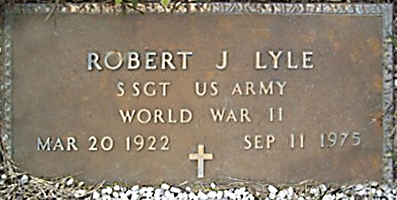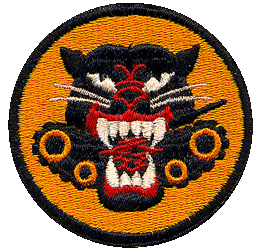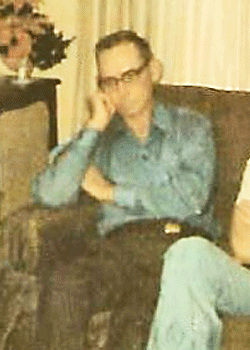 Robert J. Lyle
Robert J. Lyle
Biography: Robert J. Lyle was born on March 20, 1922, in Yorkville, Georgia. He was the son of Reuben Raleigh Lyle and Alice E. Estes and attended local schools through the 11th grade. His enlistment record indicates that he served in a National Guard artillery unit prior to the war.
Service Time: Robert entered the Army on February 24, 1941. We believe he was serving in the 179th Field Artillery Regiment, which was a Georgia National Guard unit and the 24th is the same day that they entered federal service at Camp Blanding, Florida. The unit was assigned to the 74th Field Artillery Brigade of the IV Corps and was deployed as part of the coastal defenses near Jacksonville, FL. From there, 6 officers and 160 enlisted men from the unit were reassigned to form the core of the 74th Provisional Anti-tank battalion and later become the 774th Tank Destroyer battalion on December 15th, after the attack of Pearl Harbor. We know that Robert was assigned to Company B, of the 774th, at the rank of Corporal.
Robert continued to train with the 774th until July 1942, when he was sent to the 825th as part of the cadre to form the new unit, which was activated on August 10th, at Camp Gruber, Oklahoma. Robert was again assigned to Company B and trained at a number of facilities, including Camps Bowie and Hood in Texas, and Camp Phillips, Kansas.
The 825th was originally trained with self-propelled tank destroyers but in July of 1943, they were reorganized as a towed battalion utilizing the 3″ anti-tank gun. Due to the critical shortage of civilian workers, the unit was sent to Fargo, North Dakota, to assist with the harvesting of the wheat crop. Their work produced enough wheat to supply a loaf of bread to every man, woman, and child in the United States.
The 825th continued their training back at Camp Phillips, but moved to Galatin, Tennessee, to participate in winter maneuvers held in designated areas throughout the state. They then proceeded to Camp Campbell, Kentucky, in January 1944, and remained there until March, when they were sent to Camp Breckinridge, Kentucky. On May 25th, they boarded trains and arrived at Camp Kilmer, New Jersey, in preparation for shipment overseas.
The 825th sailed from the New York port on May 30th, 1944, aboard the Queen Elizabeth, arriving in Scotland on June 5th. After an additional 2 months of training, the men and equipment were loaded on LST’s and arrived on Utah Beach in Normandy, France in July 30th. They were equipped with 3″ towed anti-tank guns and were initially assigned to the Communications Zone where they performed 12th Army Group security duties between August and December, 1944. On 17 December, the battalion entered combat near Malmedy, Belgium and returned to security duties on January 16, 1945. The 825th received credit for the campaigns of Northern France, Rhineland, Central Europe and Ardennes-Alsace.
Although the details are not clear, during the occupation period while visiting Paris, Robert was involved in an vehicle accident, which we believe caused the Jeep he was traveling in to roll over. Robert received a serious brain injury, which put him in a coma and he remained in that condition when he shipped home. After he came out of it, he still had difficulty walking and talking and required an extended amount of rehabilitation. He was finally discharged on August 18, 1947, at the rank of Staff Sergeant.
Sadly, Robert’s injuries had a lasting effect, which rendered him unable to hold a job. He tried very hard to lead an independent life, even trying to start a business. His family was very close and although they tried to help him, he wanted to make it on his own. He did come to all the family gatherings and years later would live with his sister Ruth for a while. Robert also had a small group of friends that he would meet with to play cards.
He did have one souvenir of the war that was shipped home with him, a beautiful German dagger with a swastika armband wrapped around it. Robert’s nephew, Doug, asked him about the dagger and arm band and he explained that he and a few other men slipped behind enemy lines for a reconnaissance mission. He had taken them from a German officer and placed them in his backpack, which was ultimately sent home with his other processions. As Doug grew older, his uncle became more and more of a hero to him with everything that Robert had done and sacrificed for this country.
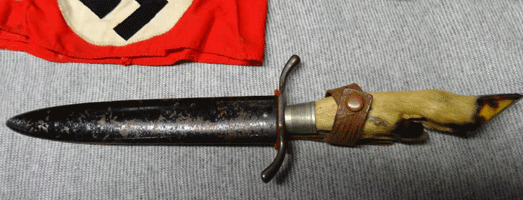
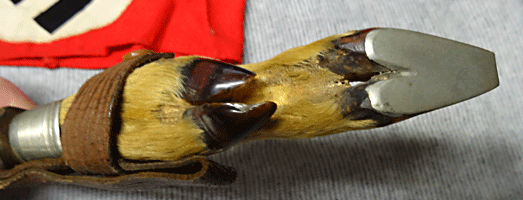
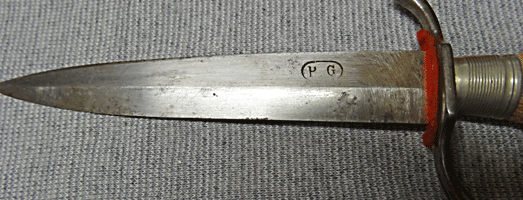
Robert passed away on September 11, 1975, and was buried in the Yorkville Methodist Church Cemetery in Paulding, GA. I want to thank Robert’s nephew, Doug, and his niece, MaryAnn, for providing the information and photos used in this tribute. Doug served in the Army during the Vietnam War from 1966 to 1968, and is certainly worthy of our recognition here. I want to thank Serge Lemaire for originally contacting the Lyle family and all of his research to honor these men and thank you to Sandy Lyle for the use of the grave marker photo.
